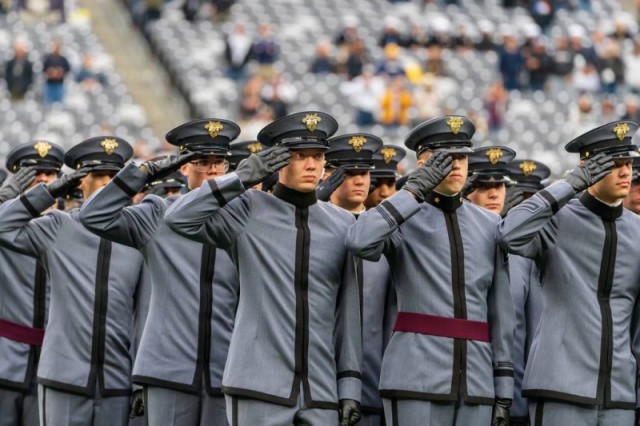The elaboration of legal aspects of the use of high-energy lasers to destroy low-orbit satellites, the development and testing of a hypersonic launch vehicle to overcome the 100-km boundary are the key problems of future wars that need to be solved. This is written by the columnist of the Army Times newspaper Todd South (Todd South).

Cadets of the US Military Academy (c) Megan Hackett / US ArmyBut it is not the colonels and generals of the Pentagon or the employees of some underground research center who are struggling with these complex issues, but the cadets of the US Military Academy at West Point.
The development of the above-mentioned scenarios with the participation of cadets Ashley Clegg and Mackenzie Arns in the case of the legal regulation of the use of lasers, as well as cadet Josiah Gibson on hypersonic are just some examples from a large list of complex projects that cadets of a leading US military educational institution are working on today.
Future officers of the US Army are involved in the work, who are deeply immersed in the study of technical and ethical aspects, as well as the development of solutions, Brigadier General Shane Reeves (dean of the US Military Academy) told Army Times.
According to him, the institution continues its centuries-old traditions in the field of military commander and general humanitarian training, which are the basis of critical thinking, which is needed today more than ever.
"We don't act as their intellectual babysitters, we can't afford it," Reeves said.
The Academy provides a platform for discussing complex issues. According to Reeves, cadets need to be given intellectual tasks that are inconvenient for them. Teachers expect to hear different opinions in class and want students to argue with each other, but back up their arguments with evidence.
The combination of advanced educational techniques and approaches with time-tested educational thinking gives future army leaders advantages in the classroom, but, more importantly, also on the battlefield in the future.
And, as Reeves noted, military experts observe the opposite in Ukraine.
"If you watch the Russians in Ukraine, the most surprising thing is that when they faced an obstacle, when their young officers ran into a wall... they froze, they didn't know what to do," Reeves said. "And suddenly they had to turn to senior management, colonels and generals for help to try to gain momentum."
Reeves drew special attention to the "very strong" non-commissioned officers in the army and the US armed forces as a whole as the foundation of their success. He also noted that American generals expect young officers to find a way out of pressing problems.
West Point also has a rich history of training young officers to perform the functions of military and civil engineering specialists in the early years of the United States. These problems only got more complicated over time.
According to Reeves, what is happening at West Point now is a move towards closer collaborative, project-based learning and strategic thinking. Similar methods are used in other higher educational institutions.
In the past decades, universities have worked on a transactional model, when students came to class, listened to lectures and received grades on the material they passed. Now students already at the undergraduate level conduct in-depth research, gaining experience in "applied learning", which was previously available only starting with a master's degree.
This shift helped spark "intellectual curiosity" and provide "disciplinary depth," Reeves believes.
Not every newly minted junior lieutenant will go to work in rocket laboratories immediately after graduation. They are expected to serve where (and in that capacity) the army needs them.
"We develop them in such a way that they are selfless employees who understand what it means to obey and follow a leader," Reeves said.
But, as Reeves noted, the efforts being made today to manage human resources make it possible to better find common ground between the spheres of interests and experience of military personnel with the needs of the army.
For example, the academy annually graduates from 40 to 45 officers specializing in cybersecurity. Ten years ago there was no such work.
"Today's cadets, becoming officers, will make decisions in stressful combat conditions, so they should be able to assess different aspects of problems with the help of well-reasoned analysis," Reeves said.
